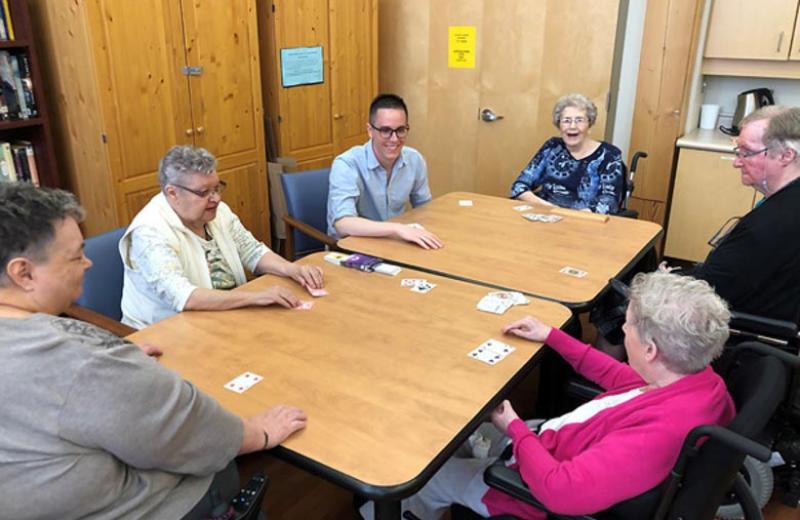University students are calling a seniors’ care facility “home” as part of an ongoing, experiential project that has set fertile ground for blossoming friendships, teachings, learnings, and research results.
The Intergenerational Activities for Growth and Engagement (InterAGE) Project was born when researchers at the University of Northern BC (UNBC) partnered with Northern Health, and a pilot project began in September 2018 with two UNBC students spending their Fall semester (four months) living in Gateway Lodge long-term care and assisted living facility in Prince George. As part of their full course load of university credits, the students enrolled in the experiential learning course, during which they were required to spend a minimum of 10 hours a week engaging in activities with the senior residents. The pilot project was a terrific success and has led to the continuation of the InterAGE Project.
“The students bring such a new and interesting perspective to our programming,” says Therapeutic Recreational Therapist Lynn Aucoin, describing the short- and long-term benefits of the project. “They’ve made great suggestions to augment what we offer, including adding more evening and weekend programming. I think the initiative is phenomenal!”
One of the first projects of its kind in Canada, InterAGE is compiling evidence-based results on intergenerational living. The research/experiential learning project is led by UNBC’s Dr. Shannon Freeman, Assistant Professor in the School of Nursing, and Prof. Dawn Hemingway, Associate Professor in the School of Social Work.
“The neat thing for me has been to observe the sharing between the students and the residents,” says Dawn. “The sharing of lifelong learning, with an open dialogue, in a class environment in a residential home. It’s been remarkable to see the exchange of ideas and experiences between the students and residents.”
Hemingway is referring to the weekly open class that is held in a bright and airy room at Gateway Lodge. Seated at tables in comfy chairs – sometimes with the fireplace on during Prince George’s chillier months – InterAGE students, any Gateway residents interested in participating, and guest speakers (including academics, professionals, and community members) gather to learn and discuss a wide variety of topics, such as:
- Autonomy and risk.
- Digital media and technology use to support well-being in later life.
- Myths and stereotypes of aging.
- Cognitive health in later life.
- Grief, loss, and transitions.
The classes are held in a seminar style, supporting a safe environment for individual sharing and discourse.
“Going to the classes became one of the highlights of my week,” says Agnes, a Gateway resident who regularly attends the classes. “I’ve also had an opportunity to meet more of the other residents and also hang out with young people – it’s been great!”
Another Gateway resident, John, credits morning chats over coffee, and activities and games with helping him socialize more.
“The lectures are a really great learning experience. I learned that socializing and doing activities gets me out of my chair – it’s a really good thing.”
This project requires the trust and support of facility staff and leadership to succeed, and their impressions after the completion of an academic year are very positive.
Sandra Barnes, Manager of Residential Programs, oversees seniors’ programs and services in Prince George as a whole, including at Gateway Lodge. She sees the impact InterAGE is having at the service and individual levels as well. For Sandra, the students’ and seniors’ interactions are profound; as are the connections with the researchers and guest lecturers.
“We have new programs, new expertise informing our services – these relationships are so valuable,” says Sandra. “[This program] provides something unique. It’s different and innovative. We’re seeing new relationships develop among our residents as people from different aspects of care [and areas of the facility] gather to participate.”
Zachary Fleck recently took part in the Winter semester portion of InterAGE. Zachary is a third-year International Studies student who applied to participate in the program for the unique academic perspective. While he moved in anticipating the experiential learning, some of what he learned went well beyond scholarly pursuits.
“I’ve developed really meaningful relationships while I’ve been here,” says Zachary. “I’ve been able to create brand-new perspectives.”
The positive practical results of InterAGE’s pilot year may impact future planning for Prince George’s aging population as the program continues into the 2019-2020 academic year. Additionally, the project’s research outcomes will be shared among leaders in the long-term care field.
“When we started the project, it was the great unknown… would it work? Could it work?” muses Dr. Freeman. “With collaborative relationships, we’re able, as educators, to offer real experiential learning in this environment, and I value that so much. This is just the beginning. We’re continuing to learn and grow and recruit more students for the next semester!”
The success of the project, which brought young strangers into a seniors’ home, with all the potential worries and unknowns, can be summed up by one of the facility’s vibrant elders, ninety-two-year-old Rose.
“I noticed that Zach talked to everyone. And I’m thrilled to have lived this long, to see something so wonderful come to be. I said to Zach,” Rose says as she opens her hands in a welcoming gesture, “‘Come in, come in… you’re part of our family now.’”
UNBC students interested in participating in InterAGE or learning more about the project can contact either:














Comments